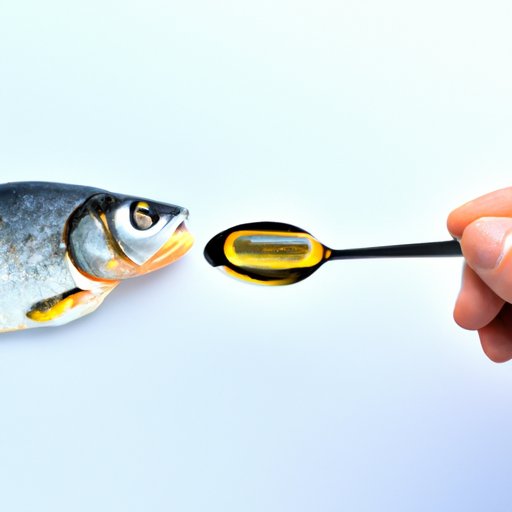
Introduction
When it comes to consuming fish, there is much debate on how often it should be consumed. While fish is a great source of protein and essential nutrients, it can also come with risks such as overconsumption of mercury and potential environmental harm. In this article, we will explore the benefits and risks of eating fish daily, alternative options, fish preparation, and offer some fish-based recipes to help incorporate this nutrient-rich food into your everyday diet.
Benefits and Risks of Eating Fish Every Day
Fish is a great source of essential nutrients, particularly protein and omega-3 fatty acids. Omega-3s have been linked to decreased inflammation, improved brain function, and a reduced risk of heart disease. However, consuming fish every day can also have potential risks, such as exposure to mercury and other environmental toxins. It is important to weigh these benefits and risks when considering consuming fish every day.
Types of Fish and Nutritional Value
Not all fish is created equal. Some fish species are healthier than others and have greater amounts of omega-3s, vitamins, and minerals. Salmon is an excellent source of these essential nutrients and is also low in mercury. Tuna is another popular fish option, but it’s important to note the different types of tuna, as some contain higher levels of mercury. Other types of fish, such as cod, mackerel, and sardines, are also great sources of beneficial nutrients.
Fatty fish, such as salmon and mackerel, are particularly beneficial for specific health conditions such as arthritis, cognitive function, and cardiovascular health. These fish types contain high levels of omega-3s, which can help reduce inflammation and improve brain function. It’s important to incorporate a variety of fish types into your diet in order to reap these nutritional benefits.
Balanced Meals
Consuming fish as part of a balanced and varied diet is crucial to reaping its benefits. Eating fish daily should be complemented by other nutrient-rich foods, including fruits and vegetables, whole grains, nuts, and legumes. It’s important to not rely on fish as the sole source of nutrition, as it may not supply all essential nutrients needed for good health.
When it comes to serving size and frequency, the American Heart Association recommends consuming fish twice per week, or approximately 3.5 to 4 ounces. It’s important to be mindful of portion sizes, as overconsumption of fish can lead to mercury poisoning and other health concerns.
Alternatives to Fish
If you do not consume fish or prefer to limit your fish intake, there are alternative options to still receive beneficial omega-3s. Flaxseed, chia seeds, and walnuts are all excellent sources of plant-based omega-3s. Additionally, there are plant-based supplements available that contain omega-3s. For those who don’t consume meat or fish, plant-based proteins such as tofu, tempeh, and legumes can provide essential protein.
Fish Preparation
How you prepare fish can also affect its nutritional value. Grilling, baking, and roasting are healthy preparation methods that help preserve nutrients while reducing fat content. It’s important to avoid frying and to opt for healthy fats such as olive oil.
When it comes to cooking fish, it’s important to avoid overcooking, which can lead to nutrient loss and a less palatable fish. Fish can also be marinated or seasoned to add flavor and avoid excessive salt and fat intake.
Environmental Impact
Consuming fish every day can have an impact on the environment as well. Overfishing has become a major issue, depleting fish populations and ecosystems. Additionally, environmental contaminants, such as mercury and PCBs, can harm aquatic life and pose risks to human health. It’s important to choose fish that have been sustainably and responsibly sourced to minimize environmental harm.
Fish-based Recipes
Here are a couple of fish-based recipes to inspire you to incorporate fish into your daily diet:
Salmon and Avocado Poke Bowl
Ingredients:
- 1 lb sushi-grade salmon
- 2 avocados diced
- 2 cups steamed rice
- 1 cup shredded carrots
- 1 cup edamame
- 1 tablespoon sesame oil
- 1 tablespoon rice vinegar
- 2 tablespoons soy sauce
Instructions:
- Cut the salmon into bite-sized pieces and mix with sesame oil and soy sauce.
- Combine the carrots, edamame, and avocado in a separate mixing bowl.
- Place the rice in a bowl, then add the salmon and vegetable mixture on top.
- Sprinkle rice vinegar over the top and enjoy.
Tuna Salad Lettuce Wraps
Ingredients:
- 2 cans of tuna, drained
- 1/2 cup plain Greek yogurt
- 1/4 cup diced celery
- 1/4 cup diced red onion
- Salt and pepper to taste
- Romaine lettuce leaves
Instructions:
- Mix together the tuna, yogurt, celery, red onion, salt, and pepper in a mixing bowl.
- Spoon the tuna mixture into the lettuce cups.
- Wrap the lettuce around the tuna mixture, like a burrito or spring roll.
- Enjoy.
Conclusion
There are benefits and risks to consuming fish every day. While it is an excellent source of essential nutrients, it’s important to be mindful of environmental impact, portion sizes, and cooking methods. Incorporating a variety of healthy foods into our everyday diet is critical to good health and well-being. Always choose sustainably sourced fish for responsible consumption, and enjoy fish-based recipes that are both delicious and nutritionally balanced.





